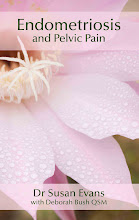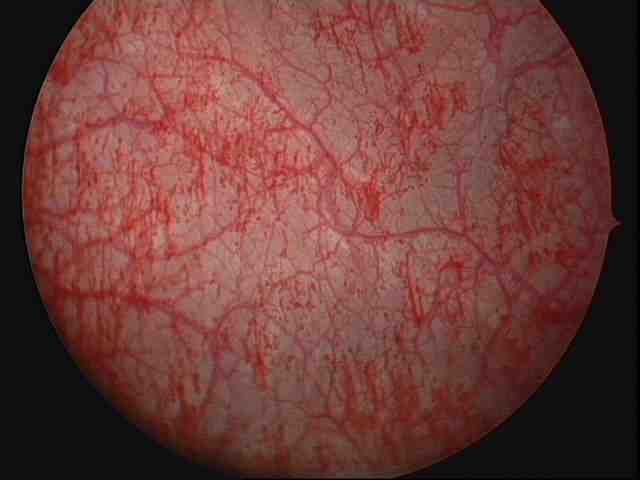Molly is a 35 year old patient of mine. When she was 28, she had bad period pain and was trying to become pregnant. She had a big operation with excision (cutting out) of endometriosis and then had 2 children.
Molly came to see me again recently with lots of different problems, sure that she had her endo back again. Sex was painful, period were painful, she was going to the toilet all the time, there were frequent headaches and her bowel was very irritable. At her laparoscopy, I found only 2 small areas of endo. Otherwise all had healed very well from her previous surgery. She felt confused that she had so much pain, but very little new endometriosis. I explained that there is a much 'bigger picture' to endometriosis than just the black lesions in the pelvis.
Women who have EVER had endo, have a higher chance of getting several other painful conditions. Molly had a painful uterus (the period pain), interstitial cystitis (the bladder troubles and painful intercourse), chronic migraine (the headaches), food intolerances and a sensitised bowel. She doesn't need any more surgery and she doesn't need any hormonal treatment/Lupron.
We are treating her problems with dietary changes (her bladder and irritable bowel), amitriptyline (for her headaches and bladder) and a mirena iucd (her period pain).
Help with your pain
Endometriosis is much more than just brown/black spots in the pelvis that can be seen at a laparoscopy. There are many different problems that women with endometriosis suffer.
Some women will have painful periods, but be otherwise completely well. Others have a more complicated picture that can include:
- an irritable bowel (IBS)
- sharp, stabbing or burning pains
- an irritable bladder
- painful intercourse
- bad headaches or migraines
- fatigue and exhaustion
- pain moving around or sitting for a long time
- trouble sleeping
Not surprisingly, women with these problems feel worn down and miserable.
Because these problems cover several different areas of medicine, women often feel lost 'between the cracks' of healthcare. Each health practitioner they see cares for a small part of the whole picture, with variable success.
Surgery is helpful for some aspects of the pain, but can leave many women disappointed.
I hope that you will find this blog useful for your pain. Each week there will be a new topic covered, and your comments are welcome.
Some women will have painful periods, but be otherwise completely well. Others have a more complicated picture that can include:
- an irritable bowel (IBS)
- sharp, stabbing or burning pains
- an irritable bladder
- painful intercourse
- bad headaches or migraines
- fatigue and exhaustion
- pain moving around or sitting for a long time
- trouble sleeping
Not surprisingly, women with these problems feel worn down and miserable.
Because these problems cover several different areas of medicine, women often feel lost 'between the cracks' of healthcare. Each health practitioner they see cares for a small part of the whole picture, with variable success.
Surgery is helpful for some aspects of the pain, but can leave many women disappointed.
I hope that you will find this blog useful for your pain. Each week there will be a new topic covered, and your comments are welcome.
REMEMBER OUR FACEBOOK SITE 'PELVIC PAIN NEWS' FOR ALL THE LATEST IN PELVIC PAIN INFORMATION
With best wishes,
Dr Susan Evans, Gynecologist and Laparoscopic surgeon
Tuesday, November 17, 2009
Tuesday, November 3, 2009
Is my period pain normal?
Women only know what their own period feels like. They can't compare it with their friend's period pain. Sometimes they wonder if their periods are really normal and they are just weak in some way. It's a dreadful feeling to wonder if 'its all in your head'.
Normal period pain should only last 1-2 days, and it should go away almost completely on the oral contraceptive pill and period pain medications like ibuprofen or naprosyn taken early before the pain is bad.
If your period pain lasts longer than this, or if these medications dont help you, then it is not normal period pain.
An ultrasound scan is usually normal in most women with endometriosis.
Normal period pain should only last 1-2 days, and it should go away almost completely on the oral contraceptive pill and period pain medications like ibuprofen or naprosyn taken early before the pain is bad.
If your period pain lasts longer than this, or if these medications dont help you, then it is not normal period pain.
An ultrasound scan is usually normal in most women with endometriosis.
Friday, October 16, 2009
Too young for endometriosis?
It's really sad that some teenagers are told that they are 'too young to have endometriosis'. They don't get the help they need and suffer a lot of period pain.
Doctors used to think that endometriosis was an uncommon problem of women in their 30s and 40s. We now know that's not true. Endometriosis in teenagers is common, but it can be difficult to see at a laparoscopy and almost never shows on an ultrasound.
Some period pain with periods on the first day of a period can be normal, but if you have any of the following problems, you could have endometriosis:
* Period pain that lasts more than 1-2 days each month
* Period pain that doesn't get better on the contraceptive pill
* Period pain that doesn't get much better on period pain medications like diclofenac, ibuprofen, mefenamic acid or naproxen.
If you have bad periods, the teen website at endometriosis new zealand has teenagers just like you. Check out www.me.school.nz
Best wishes,
Dr Susan Evans
Doctors used to think that endometriosis was an uncommon problem of women in their 30s and 40s. We now know that's not true. Endometriosis in teenagers is common, but it can be difficult to see at a laparoscopy and almost never shows on an ultrasound.
Some period pain with periods on the first day of a period can be normal, but if you have any of the following problems, you could have endometriosis:
* Period pain that lasts more than 1-2 days each month
* Period pain that doesn't get better on the contraceptive pill
* Period pain that doesn't get much better on period pain medications like diclofenac, ibuprofen, mefenamic acid or naproxen.
If you have bad periods, the teen website at endometriosis new zealand has teenagers just like you. Check out www.me.school.nz
Best wishes,
Dr Susan Evans
Tuesday, October 6, 2009
Bladder Troubles
Many women with endometriosis also have bladder troubles. These can start even after all the endometriosis has been removed. The sort of troubles they have include:
1. Frequency (going to the toilet a lot)
2. Urgency (needing to rush to the toilet)
3. Nocturia (getting up at night to go to the toilet)
It's also common to have pain with intercourse because the bladder is painful and pressing on it during intercourse causes pain.
Some women have times when their bladder is especially bad and they think they have a urine infection. If the urine is collected, often there is no infection found. Just a bit of blood in the urine.
This problem if often due to a condition called Interstitial Cystitis. If you have this problem, there is lots that can be done. We would love to hear your story.
Friday, September 25, 2009
Should I go gluten free?
Many women with endo also have an irritable bowel (IBS). When they go 'gluten free' they feel better, but do they really have a problem with gluten? If you cut down on foods with gluten, you also cut down on foods with wheat in them. Wheat releases a type of 'sugar' in the gut called fructan, which some people find difficult to absorb. A little bit of bread is fine, but if they have a larger amount, they have wind, pain, and maybe diarrhoea. The latest information shows that it is fructose and fructans which often cause the problem, rather than gluten.
Have you found any foods that bother you? or anything that helps?
Tuesday, September 22, 2009
sharp and stabbing pains
Sharp and stabbing pains are really common in women with endometriosis. If you are woken at night with pain when it is not your period, it is often sharp or stabbing pains that are the problem. Unfortunately, these pains don't usually get better with surgery. They are due to a change in the way that the nerves from the pelvis send pain impulses to your brain.
The problem is certainly NOT 'all in your head'. It is 'all in the nerves'. Doctors call this 'neuropathic pain'. It is also common in people with a bad back, sciatica, and diabetes. You have probably already realised that most normal pain killers don't help this type of pain.
The good news is that it can be managed successfully with a combination of:
- medications (amitriptyline, pregabalin, gabapentin or valproate)
- exercise (start slowly or you will get worse to start with)
- regular sleep (will be easier once you are on a medication)
- moving on from, or resolving stress in your life
Stress did not cause the problem but it can aggravate it.
While the pain is severe, it does not mean that you have cancer and is not a dangerous pain.
If you have our book on pelvic pain, it is covered in more detail on pages 58-67. The medications that help this pain are covered on pages 180-182. Your local doctor will be able to prescribe these for you.
The problem is certainly NOT 'all in your head'. It is 'all in the nerves'. Doctors call this 'neuropathic pain'. It is also common in people with a bad back, sciatica, and diabetes. You have probably already realised that most normal pain killers don't help this type of pain.
The good news is that it can be managed successfully with a combination of:
- medications (amitriptyline, pregabalin, gabapentin or valproate)
- exercise (start slowly or you will get worse to start with)
- regular sleep (will be easier once you are on a medication)
- moving on from, or resolving stress in your life
Stress did not cause the problem but it can aggravate it.
While the pain is severe, it does not mean that you have cancer and is not a dangerous pain.
If you have our book on pelvic pain, it is covered in more detail on pages 58-67. The medications that help this pain are covered on pages 180-182. Your local doctor will be able to prescribe these for you.
Subscribe to:
Posts (Atom)



